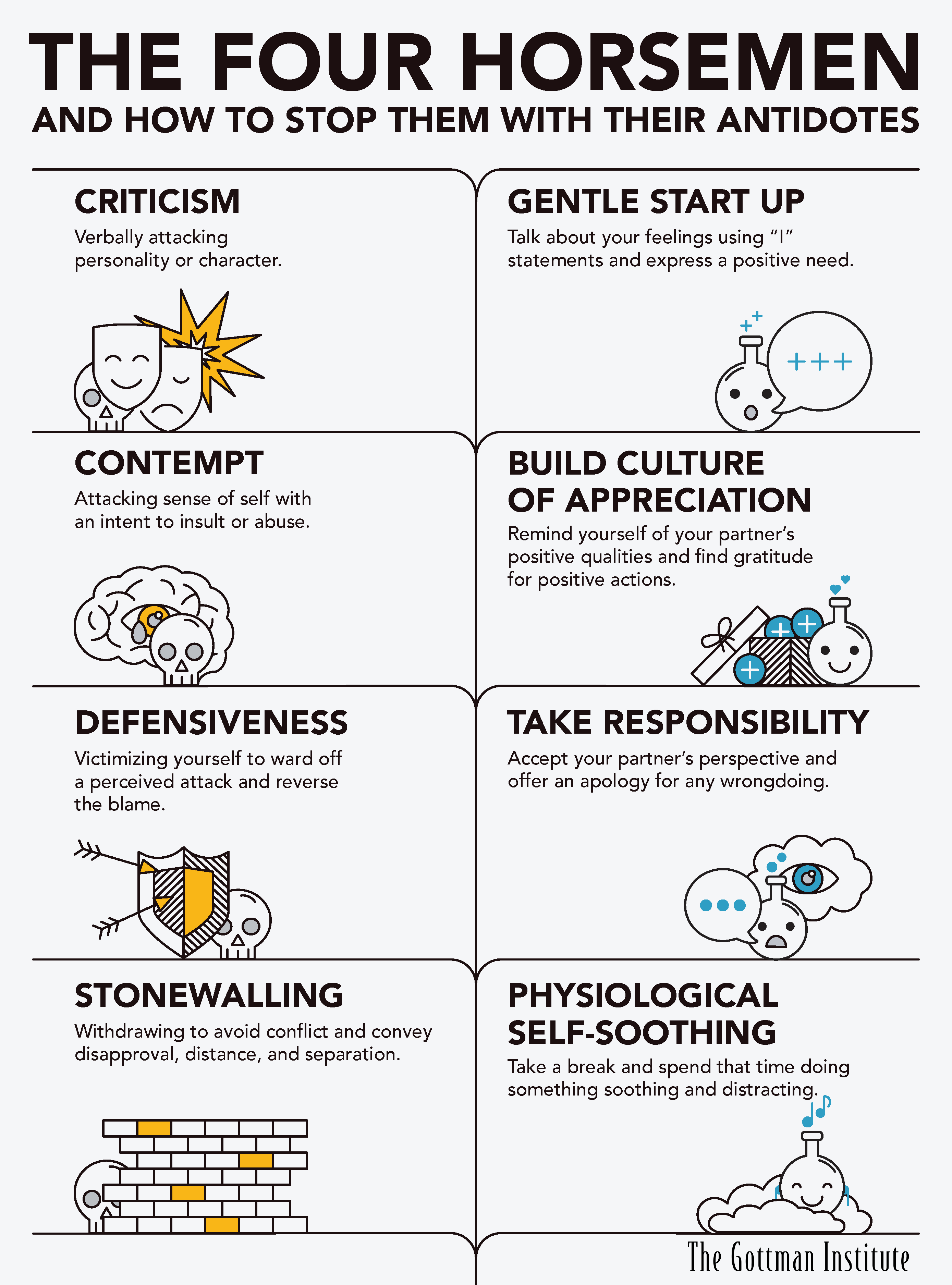Positive relationships are integral to our mental health, physical health, and emotional wellbeing. A positive relationship is between any two people who share love, support, and encouragement both practically and emotionally. However, negative relationships can be more detrimental to our well being than solidarity. So how can we nip them in the bud when we find ourselves in negative relationships…?
How can we identify negative relationships?
The Gottman Institute (research-based relationship approach) outlines a metaphor used for the four biggest indicators of negative relationships: ‘The Four Horsemen’ – a metaphor depicting the end of times in the new testament. This has been used in psychology to describe communication styles that ultimately lead to negative relationships. They include:
- Stonewalling
- Contempt
- Defensiveness
- Criticism

By identifying these traits or styles, you will be able to recognise if the relationship you’re engaging in is negative.
Recognising the effects they have on us
So, what is so bad about negative relationships? Negative relationships are something ongoing (if they are left for a period). They can be considered a chronic stressor, something that impacts our health in all aspects of life. Prolonged conflict through negative relationships is considered worse for wellbeing than social isolation. Research has shown prolonged conflict effects have a direct correlation with negative effects on the cardiovascular system. This shows lower self-rated health and more health issues than those in positive relationships. Prolonged stress research indicates negative health impacts on the brain, thyroid, immune system, and weight problems.
Additionally, individuals in negative relationships are more likely to exhibit lowered self-worth and confidence. It also increases self-doubt, helplessness, fear, anxiety, depression, insecurity, paranoia, and decreased motivation and productivity in the workplace.
How can they be helped?
Through effective conflict resolution, some negative relationships may have hope of developing more positively. Just because there is conflict, does not necessarily mean the relationship should end. In some relationships, one person might be very dissatisfied, while the other is completely unaware of an issue. Addressing this situation means conflict but may lead to positive outcomes. Sometimes silence can be destructive and arguing can be productive. Referring to the antidotes of The Four Horsemen can help in tackling some key characteristics of negative communication styles.
If you have found you’re at gridlock and are unable to engage in effective conflict resolution, conflict escalating and nasty communication are common habits to go to. If this is what you find what happens, it might be helpful to consult a relationship counsellor. Some individuals are resistant towards couples counselling due to the stigma associated with it. Common beliefs include that if you require couple counselling, you’re not strong enough to work through things together or that you have failed. Another belief is that you may be ignoring issues out of fear towards the challenge that seeking counselling will expose. However, couples who have overcome this have experienced successful outcomes. These include improved communication, enhanced relations and bonds, ability to negotiate and re-establish commitments, boundaries, and expectations – things that may feel near impossible without additional support.
How to know when to end negative relationships
There is a lot of pointers on how to save failing relationships. But not so much on how to end them. Knowing when to end negative relationships begins with identifying the signs (as outlined earlier), accepting these and committing to change. Try your best to not let cognitive dissonance overcome your desire to change or end these negative relationships.

You should expect to be treated with kindness, love, affection, and respect, and not tolerate emotional or physical abuse. You should also expect your partner to be loyal, and not feel guilty for wanting to end a relationship if these things are not happening, or if you notice it is impacting you negatively in any way. This is not giving up. One of the purposes of relationships is to teach us how to be in other relationships – how to recognise what you do or don’t want, your desires and your boundaries, for future relationships.
Sometimes you cannot avoid negative relationships (work-related, family etc). Therefore managing these relationships may need practice before removing them all together. Relaxation techniques have shown to be helpful in these situations. Overall, the best outcome is to do your best in maximising and prioritising those relationships that make you feel good.
Whether you are helping them or ending them – prioritise yourself, your boundaries, and your expectations at the forefront. Practising positive affirmations regarding desired relationship outcomes can help you challenge and overcome self-sabotaging thoughts. Practising gratitude reflection can give rise to awareness of what you appreciate in those positive relationships you do have around you, making it easier to identify the negative ones.





1 thought on “The Impacting Effects of Negative Relationships”
Comments are closed.